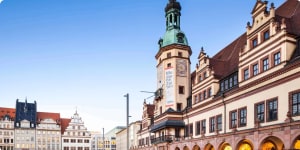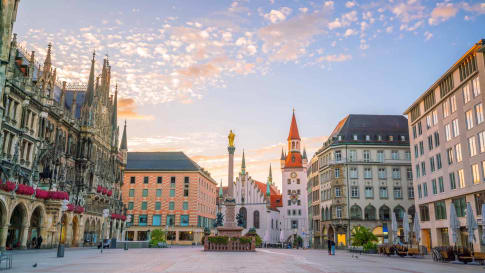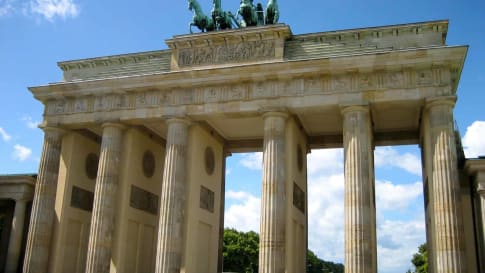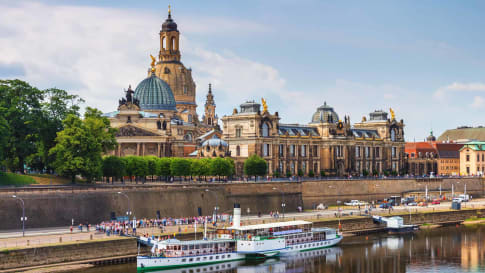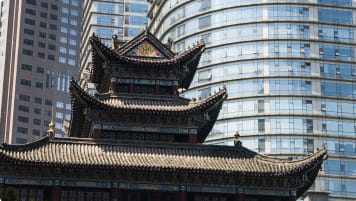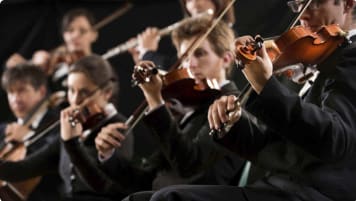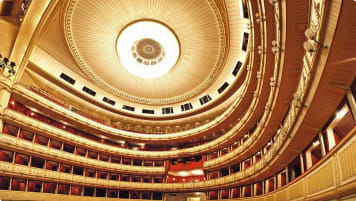Richard Wagner Ring Cycle, Leipzig | Small Group Tours Germany
The small group tour will see the opera performed in the capital of classical music, Vienna. We also visit Munich, Bayreuth, Leipzig, and Dresden. We will not only experience his music in these 4 operas, but also be shown the influences of culture and family on the extraordinary composer’s life.
From $8,228USD
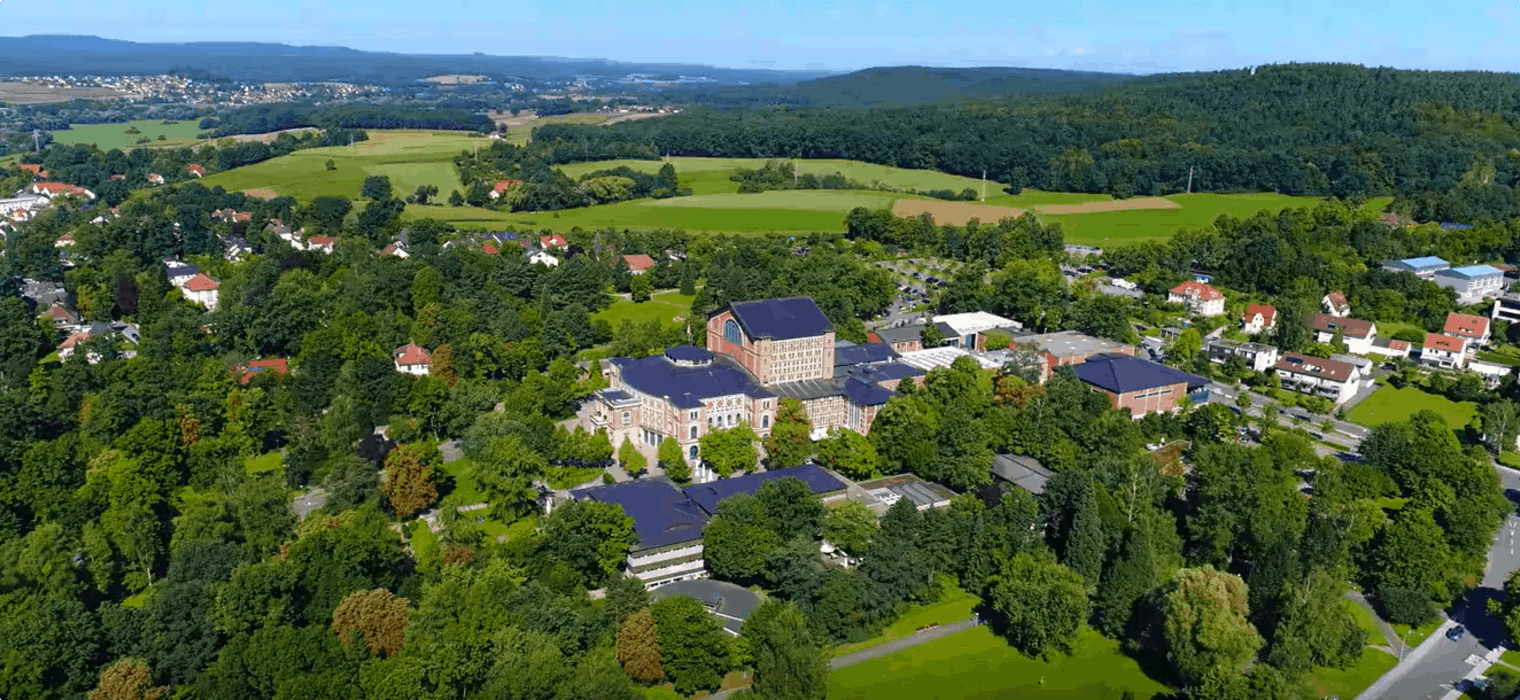
Highlights
- 1. Guided tours of sites related to Wagner's life in Leipzig and Dresden
- 2. Entrance to Mozart's House and Beethoven's Pasqualatihaus
- 3. A visit to Bayreuth's magnificent Margravial Opera House
- 4. A visit to the impressive art collection at Moritzburg Art Museum Halle

Departure Dates
| Departure Date | Price |
|---|---|
| 19 June 2025 Ends 08 July 2025 • 20 days $8,228 Twin $10,277 Single Available | Selected |
| 18 June 2026 Ends 07 July 2026 • 20 days $8,691 Twin $10,786 Single Available | |
| 17 June 2027 Ends 06 July 2027 • days $9,021 Twin $77,322 Single Available |
Richard Wagner Ring Cycle Tour
Odyssey offers easy, convenient, and relaxed escorted small group tours across Western Europe and beyond. Join us as we explore Austria and Germany's rich cultural and musical heritage across Vienna, Munich, Bayreuth, Leipzig, and Dresden, as well as daytrips to nearby towns and villages. Each location offers a unique glimpse into Europe’s imperial heritage, World Heritage sites, and truly breath-taking landscapes, with the highlight being Vienna’s renowned opera scene. This and more is all waiting to be explored on one of Odyssey’s small group music tours of Austria and Germany, designed for the senior traveller and led by experienced and enthusiastic guides who share a passion for music and history.
Richard Wagner's Ring Cycle, or Der Ring des Nibelungen ("The Ring of the Nibelung"), is a cycle of four German-language epic music dramas based loosely on characters from the Norse sagas and the epic poem Nibelungenlied. Odyssey Traveller's 20-day Wagner Ring Cycle Tour gives you the opportunity to see the extraordinary grand operas performed in the world capital of classical music, Vienna. Here world-class venues and orchestras bring Wagner's visionary work to life, providing an unparalleled atmosphere that enhances the drama and intensity of this masterpiece, making for a truly unforgettable experience for any music lover. Vienna’s abundant tradition of music, opera, and art provides a vivid setting, with the city’s classical architecture, grand palaces, and renowned art collections enriching the experience along the way.
Of course, there was more to Wagner than the romantic, thrilling notes of his operas. The man himself lived a passionate life, which was characterised by turbulent love affairs, financial scandal and a period of political exile. In this unique tour, we will not just experience this incredible operatic story, but we will also learn more about Wagner's life and the influences of culture and family on his music, and about other musical greats who worked and lived in these cities.
Der ring is for a maximum of 12 mature and senior travellers on a small group tour, either as couples or solo, accompanied to the magic ring by a tour director to guide you through Wagner's legendary tale.
Richard Wagner and the Ring Cycle:
German composer Wilhelm Richard Wagner (1813-1833) is sometimes described as having marked the start of modern music. Technically and artistically innovative, Wagner's work is classical music at its most emotionally intense and deeply introspective, reflecting both the broader political struggles of the Romantic era and the turbulent personal life of the composer.
In the 19th century, most operas were designed by a separate composer, who wrote the music, and librettist, who wrote the accompanying lyrics. Wagner was unique in writing both libretto and music, fusing the two into a singular artistic vision of poetry, music, visuals and drama, which he called Gesamtkuntswerk, or "total work of art". He is also known for the use of leitmotifs (from the German, Leitmotive, literally “leading motives”) or distinct musical phrases that were associated with particular characters, places, or elements of plot.
Wagner's work was inspired by the political ferment that surrounded him. Prior to German unification in 1871, Europe's German-speaking regions were divided into hundreds of kingdoms, duchies, bishoprics, and independent cities and towns. Through the 19th century, poets and thinkers - including Wagner - were inspired by the Romantic idea of a unified Germany. Summing up his passionate commitment to the idea of a united Germany, Wagner would write of his return to Dresden after a period in Paris: 'For the first time I saw the Rhine - with hot tears in my eyes I, poor artist, swore fidelity to my German fatherland.'
Wagner's political and artistic ideas were synthesised in his Ring Cycle masterpiece, the collective name for his cycle of four operas. Wagner began to compose the cycle in exile in Zurich, Switzerland, where had been forced to flee due to his involvement in the May Uprising in Dresden in 1849. Wagner's work on the ring cycle reaffirmed his deep commitment to German nationalism: the operas are based loosely on figures from German mythology, and Wagner wrote the libretto based on his interpretation of Stabreim, alliterative verse pairs used in ancient German poetry. Yet, Wagner had abandoned the idealism of his youth, and was increasingly influenced by the deeply pessimistic philosopher, Arthur Schopenhauer, who held music to be a direct expression of the world's essence.
Wagner's time in exile was also marked by personal drama. Still married to Minna, he fell in love with Mathilde Wesendonck, whose husband was a major patron of Wagner's work. Wagner's relationship with Mathilde is believed to have inspired the other great opera he wrote in exile, Tristan and Isolde. While it is unknown whether his love was requited or ever consummated, it threw his life into disarray, as Minna found a love letter intended for Mathlide, destroying their marriage.
Wagner's Ring Cycle; The Operas
The Ring Cycle is widely regarded as the pinnacle of Wagner's work and one of the most ambitious works in the classical music tradition. The cycle is of extraordinary scale: over 15 hours long, it is typically performed over four nights. While the cycle might seem like hard work, listeners are rewarded with an epic story of gods and men, dwarfs and magic rings, and music of sublime beauty that has inspired people for over a century.
The Ring Cycle consists of four operas:
Das Rheingold (“The Rhine Gold”)
The Rhinemaidens’ gold is stolen by the Nibelung Alberich. (The Nibelung is a race of dwarves.) Alberich fashions a ring from the gold. The gods Wotan (Odin) and Loge (Loki) trick Alberich to seize the ring, which they will use as payment for the giants building Valhalla.
Die Walküre (“The Valkyrie”)
Wotan fathers twin children, Siegmund and Sieglinde, who are separated at birth but find themselves attracted to each other when they meet as adults.
Siegfried
Set years after the end of Die Walküre, and focused on the titular Siegfried, the son of Sieglinde and Siegmund, who is raised by the Nibelung, Mime.
Götterdämmerung (“The Twilight of the Gods”)
The last of the Ring cycle concerns the impending destruction of Valhalla, and centres on Seigfried and Brünnhilde. The title of the opera is a German translation of Ragnarok, a prophesied event in Norse mythology that is said to lead to the death of the gods.
The Ring Cycle would not be performed for more than twenty years after Wagner first developed the idea. The composer had been rescued from exile when Ludwig II ('The Fairytale King') came to the throne of Bavaria in 1864. A passionate fan of Wagner's work, Ludwig invited Wagner to premiere Tristan and Isolde in Munich. Yet, in typical style, Wagner's luck would soon change when he fell in love with his conductor's wife, Cosima von Bulow. Wagner's relationship with Cosima - the illegitimate daughter of composer Franz Liszt, who was twenty-four years younger than Wagner - scandalised Bavaria. Wagner and Cosima sought exile in Switzerland, and then, after marrying in 1870, moved to Bayreuth.
Once in Bayreuth, Wagner set about staging his masterpiece. Believing in the 'total work of art', Wagner built his own opera house, the Festspielhaus (or 'festival theatre'), to be the perfect complement to his masterpiece. The Ring Cycle was debuted in August 1876, at the first Bayreuth Festival, which brought admirers from around Germany and Europe.
Though the festival is now recalled as a pivotal moment, it left Wagner dissatisfied and deeply in debt. He moved to Italy for his health, returning only in the last few months of his life in 1882 to stage another festival.
Wagner has been a controversial figure, both within his lifetime and afterwards. The deep introspection of his work inspired modernist writers and artists, including Charles Baudelaire, Marcel Proust, and James Joyce, and his work on dreams is said to prefigure Sigmund Freud's psychoanalysis. At the same time, Wagner has attracted criticism for his antisemitic views, compounded by the fact that Adolf Hitler was a huge fan of his work.
Even today, Wagner inspires a passionate following like no other composer. For Wagnerians, the Bayreuth Festival - which lives on under the direction of his great-granddaughters - is a place of pilgrimage, an opportunity to see his great works as he himself designed them.
The 2020 'Wagner in Leipzig' festival is the first opportunity in forty years to see Wagner's great works performed in the city of his birth.
Our Tour Itinerary:
In addition to the concerts in Vienna, our tour takes in several places closely associated with Wagner:
Leipzig was Wagner’s birthplace and the city where his early musical aspirations took root. Known for its influential conservatory and vibrant musical community, Leipzig is where Wagner’s musical education began and where he nurtured the talents that would later produce his grand operas. The venues and sites around the city is where Wagner first encountered orchestral music, laying the foundation for his visionary compositions.
As we explore Munich, we will hear stories of Wagner’s friendship with King Ludwig II. Without Ludwig’s consistent financial support, it is unknown whether many of Wagner’s works would ever have been produced. It was here in Munich at the National Theatre that Wagner’s Tristan and Isolde was finally performed, after years of the composer’s toil, and frustrating dismissals. This opera gained a reputation as being “impossible to sing”, but finally overcame this here, thanks to the King’s unending devotion.
Following the untimely death of his father when Wagner was just 6 months old, he would move with his family to Dresden, to the residence of stepfather Ludwig Geyer. It was here that Wagner’s love of theatre and music took flight.
Bayreuth is the location of Festspielhaus (Festival Theatre), constructed especially for the performance of Wagner’s operas – the inaugural Bayreuth Festival devoted to the premier of his Ring Cycle.
As you tour Germany, you will have the chance to stroll through remarkable locations and see them through the eyes of Wagner and other talented composers. We will also visit the Walhalla Memorial, a hall of fame that includes important artists, composers, and other German cultural icons. This travel experience offers beautiful cities, a symphony orchestra, and breathtaking scenery.
2025 Wagner Ring Cycle schedule to follow
- June: Das Rheingold
- June: Die Walküre
- June: Siegfried
- June: The Twilight of the Gods
The schedule for 2026 have not yet been released. Tour dates will be adjusted accordingly.
Due to the special nature of this tour, we have limited the group size to 12 participants.
For more details, click the ‘Top 5’ or ‘Itinerary’ buttons above! If you’re keen to experience this tour, please call or send an email. Or, to book, simply fill in the form on the right hand side of this page.
You can learn more about Austria and Germany with our country profiles and see all other departures as well. You can also browse other other performing arts and musical tours Odyssey offers.
Articles about Austria and Germany
These articles are published by Odyssey Traveller or are carefully selected external sources to maximise the knowledge and enjoyment of this tour for senior travellers:
- Questions about Austria
- Questions about Germany
- Music and the Austrian Hapsburgs: The Definitive Guide
- A History of Berlin for Tourists
- The Oberammergau Passion Play
- The Bauhaus Movement
- Highlights of Austria: Schönbrunn Palace
- Destination: Germany
- Ten books to read about Berlin
- Ten of the best art galleries in Europe
- Must See Sights in Berlin
- 13 Things to know before visiting Germany
- The Telegraph: Thirty reasons why we love Germany
- A Rhine Romance: Following the Mighty River
- Lonely Planet: 48 Hours in Hamburg
- Composer of the Month: Richard Wagner
- Gods And Monsters: 5 Unforgettable Wagner Moments
- The Brilliant, Troubled Legacy of Richard Wagner
- Wagner in Leipzig
Gallery
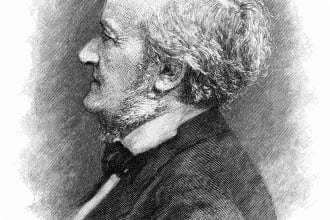
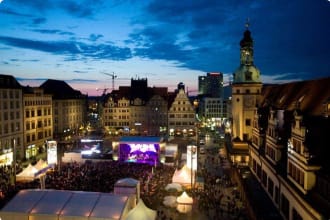
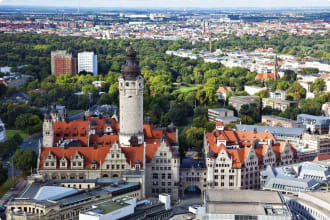
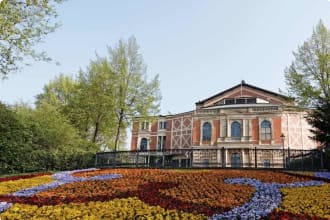





Itinerary
20 days
Day 1: Vienna
Accommodation: 10 nights at Mercure Wien City (or similar)
Arrive Vienna. Transfer to our hotel (own arrangements). There will be some free time before an evening welcome by your Odyssey Leader followed by a welcome dinner at a local restaurant.
Day 2: Vienna
Accommodation: Mercure Wien City (or similar)
The tour starts with in the morning tour with a half-day tour around the city of Vienna led by a local guide. We view the main sights of the city, including such highlights as Hofburg Palace and St Stephen’s cathedral. You will then have free time in the afternoon to explore this magnificent city further. In the evening we attend a Wagner Opera performance: Das Rheingold.
Day 3: Vienna
Accommodation: Mercure Wien City (or similar)
Today we take a full-day tour of Vienna with a local guide. We view some more of the city’s magnificent sights, including a visit to the Ring Road, a stroll through Naschmarkt, a visit to Museums Quarteir, a stop at Prater to see the Wheel, and a look at Hunterswasserhaus. After the tour, you will have the evening to spend as you wish.
Day 4: Vienna
Accommodation: Mercure Wien City (or similar)
This morning, we visit Kunsthistoriches Museum. One of the most prominent art museums in the world, its collections includes masterpieces from celebrated artists such as Pieter Bruegel the Elder, Titian, Rembrandt, Raphael, and Caravaggio. In the afternoon we visit to Academy of Fine Arts, Picture Gallery, to view European masterpieces from the Renaissance to the Baroque periods. In the evening we attend a performance of the second part of Wagner’s Der Ring des Nibelungen (The Ring of the Nibelung).: Die Walkurie.
Day 5: Vienna - Bratislava - Vienna
Accommodation: Mercure Wien City (or similar)
Today we take a day trip to Bratislava, where we enjoy a city tour and view the main sights with a local guide. This includes lunch at a local restaurant. Return to Vienna in the evening.
Day 6: Vienna
Accommodation: Mercure Wien City (or similar)
This morning we visit two museums, each dedicated to the life and works of the two most renowned classical music composers associated with the city: Mozart’s house and Beethoven Pasqualatihaus. Both composers spent significant parts of their lives in Vienna, producing many of their most famous works.
The afternoon is free to enjoy the city at your own pace. In the evening, we enjoy dinner together at a local restaurant.
Day 7: Vienna
Accommodation: Mercure Wien City (or similar)
This morning, we visit the Secession Building. The Secession Building is an iconic Art Nouveau exhibition hall and a symbol of the Vienna Secession movement, founded in 1897 by a group of rebellious artists, including Gustav Klimt, Koloman Moser, and Josef Hoffmann. The gallery hosts a number of famous permanent works, well as as contemporary exhibitions in the spirit of its founders’ commitment to new ideas and experimentation.
The afternoon is free to enjoy the city at your own pace. In the evening, we attend another opera performance, this time of Siegfried, the third of the four music dramas that constitute Wagner’s Ring Cycle.
Day 8: Vienna - Heiligenkreuz - Mayerling - Baden - Vienna
Accommodation: Mercure Wien City (or similar)
Today we conduct a full-day excursions to three historical and scenic destinations located near Vienna, Austria, each with unique cultural and historical significance. We begin with a guided tour of Stift Heiligenkreuz, a Cistercian monastery founded in 1133, nestled in the Vienna Woods. We then visit the Carmelite Monastery, a historic monastery in the small village of Mayerling. Lunch is included at a local restaurant in the spa town of Baden. You then have free time in the afternoon to explore Baden, before we return to Vienna.
Day 9: Vienna
Accommodation: Mercure Wien City (or similar)
This morning, we visit the Belvedere Museum (both upper and lower palaces) and take in the museum’s impressive collection of art, which includes pieces from the Middle Ages to the contemporary, with a focus on Austrian art, particularly works from the Viennese Secession and Expressionism movements.
In the afternoon, we visit Schoenbrunn Palace for the Imperial tour. One of Vienna’s most famous landmarks and important cultural sites, this grand Baroque palace once served as the summer residence of the Habsburg emperors and their families.
Day 10: Vienna
Accommodation: Mercuew Wein City (or similar)
This morning is free to explore the city on your own. In the afternoon, we attend an Opera performance of Götterdämmerung, the fourth and last instalment of Wagner’s Ring cycle.
Day 11: Munich
Accommodation: 2 nights at Eurostars Grand Central (or similar)
This morning we transfer to the station and board a train (1st class) to Munich. On arrival we’ll be met and transferred to our hotel, where we’ll enjoy dinner together.
Day 12: Munich
Accommodation: Eurostars Grand Central (or similar)
This morning, we enjoy a guided walking tour of Munich’s highlights, with an emphasis on stories of Wagner, including how he met King Ludwig II. The afternoon is free to explore the city on your own.
Day 13: Munich - Donaustauf - Bayreuth
Accommodation: 2 nights at Bayerischer Hof (or similar)
Today, we travel in our coach from Munich to Bayreuth. On route, we stop at Donaustauf, a small town located on the banks of the Danube River, most famous for being home to the Walhalla Memorial, a stunning neoclassical monument that commemorates notable figures in German history. In Bayreuth, we have dinner together at our hotel.
Day 14: Bayreuth
Accommodation: Bayerischer Hof (or similar)
We begin the day with a guided tour of the town, where we will see the main sights that relate to the life of Wagner. In the afternoon we’ll visit the Margravial Opera House, considered one of the most significant examples of 18th-century European theatre architecture, renowned for its exceptional acoustics and decorative interior.
Day 15: Leipzig
Accommodation: 3 nights at Viktor's Residenz hotel (or similar)
This morning we travel from Bayreuth to Leipzig. The remainder of the day is free for you to explore Leipzig at your own pace, before we reconvene for dinner together at our hotel.
Day 16: Leipzig
Accommodation: Viktor's Residenz hotel (or similar)
This morning, we take a half-day guided city tour of Leipzig that follows in the steps of Wagner. After the tour, we visit the Bach museum, located near St. Thomas Church in the heart of Leipzig, where Bach spent the later part of his life. The museum provides an in-depth look at his contributions to music and the cultural context of his time.
Day 17: Leipzig- Halle - Leipzig
Accommodation: Viktor's Residenz hotel (or similar)
Today we conduct a day trip to Halle, famous as the birthplace of Baroque composer Georg Friedrich Händel. We take a guided walking tour of the city, including visits to the striking, Gothic Marienkirche and Moritzburg Art Museum Halle, host to an impressive collection of fine art spanning several centuries, from medieval to contemporary.
Day 18: Dresden
Accommodation: 2 nights at Maritim Dresden Hotel (or similar).
This morning we transfer to the station and board a train (1st class) to Munich. On arrival we’ll be met and greeted and transferred to our hotel.
Day 19: Dresden
Accommodation: Maritim Dresden Hotel (or similar).
The tour starts with a half day tour around the city of Dresden. The focus of the guided tour is of Wagner related sites in Dresden. In the afternoon, we’ll visit the Green Vault (Grünes Gewölbe), a unique historic museum containing the one of the largest collection of treasures in Europe.
In the evening, the group will enjoy a farewell dinner at a local restaurant.
Day 20: Dresden
The tour concludes after breakfast.
Tour Notes
- Group size is limited to 12 participants
Includes / Excludes
What’s included in our Tour
- 19 nights accommodation.
- 19 breakfasts, 2 lunches and 6 dinners.
- Tickets to 4 Wagner operas.
- All excursions, sightseeing, and entrance fees as per the tour.
- Tips and gratuities.
- Detailed preparatory material.
What’s not included in our Tour
- Return international airfare and departure taxes.
- Comprehensive travel insurance.
- Items of personal nature such as laundry and phone calls.
Participants must be able to carry their own luggage, climb and descend stairs, be in good health, mobile and able to participate in 3-5 hours of physical activity per day, the equivalent of walking / hiking up to 8 kilometers per day on uneven ground.
Book now
Make it a private tour
Easing your journey
Crossing international borders with restrictions
The list of requirements to travel internationally has changed and will continue to change for several years. Odyssey is here to assist you in managing your way through these requirements:
For more information see our Crossing international borders with restrictions page.
Book With Confidence
If less than 30 days before your tour starts you are unable to travel as a result of Government travel restrictions, Odyssey Traveller will assist you with a date change, provide you with a credit or process a refund for your booking less any non-recoverable costs.
See Terms and conditions for details.
Peace of Mind Travel
The safety of our travellers, tour leader, local guide and support staff has always been our top priority and with the new guidelines for public health and safety for keeping safe for destinations around the world, we’ve developed our plan to give you peace of mind when travelling with us.
See Peace of Mind Travel for details.
Reviews
As this was my first tour alone and with Odyssey felt included immediately. The small group was like traveling just with friends. We all voiced what we would like to see etc and where possible changes were made. I would highly recommend this tour. Participant May 2018
Reading List Download PDF
Wagner: The Terrible Man and His Truthful Art
M. Owen Lee
How is it possible for a seriously flawed human being to produce art that is good, true, and beautiful? Why is the art of Richard Wagner, a very imperfect man, important and even indispensable to us?
In this volume, Father Owen Lee ventures an answer to those questions by way of a figure in Sophocles – the hero Philoctetes. Gifted by his god with a bow that would always shoot true to the mark and indispensable to his fellow Greeks, he was marked by the same god with an odious wound that made him hateful and hated. Sophocles' powerful insight is that those blessed by the gods and indispensable to men are visited as well with great vulnerability and suffering.
Wagner: The Terrible Man and His Truthful Art traces some of Wagner's extraordinary influence for good and ill on a century of art and politics – on Eliot and Proust as well as on Adolf Hitler – and discusses in detail Wagner's Tannhouser, the work in which the composer first dramatised the Faustian struggle of a creative artist in whom 'two souls dwell.' In the course of this penetrating study, Father Lee argues that Wagner's ambivalent art is indispensable to us, life-enhancing and ultimately healing.
Richard Wagner: A Life in Music
Martin Geck
Best known for the challenging four-opera cycle The Ring of the Nibelung, Richard Wagner (1813–83) was a conductor, librettist, theater director, and essayist, in addition to being the composer of some of the most enduring operatic works in history, such as The Flying Dutchman, Tannhäuser, and Tristan and Isolde. Though his influence on the development of European music is indisputable, Wagner was also quite outspoken on the politics and culture of his time. His ideas traveled beyond musical circles into philosophy, literature, theater staging, and the visual arts. To befit such a dynamic figure, acclaimed biographer Martin Geck offers here a Wagner biography unlike any other, one that strikes a unique balance between the technical musical aspects of Wagner’s compositions and his overarching understanding of aesthetics.
Wagner has always inspired passionate admirers as well as numerous detractors, with the result that he has achieved a mythical stature nearly equal to that of the Valkyries and Viking heroes he popularized. There are few, if any, scholars today who know more about Wagner and his legacy than Geck, who builds upon his extensive research and considerable knowledge as one of the editors of the Complete Works to offer a distinctive appraisal of the composer and the operas. Using a wide range of sources, from contemporary scholars to the composer’s own words, Geck explores key ideas in Wagner’s life and works, while always keeping the music in the foreground. Geck discusses not only all the major operas, but also several unfinished operas and even the composer’s early attempts at quasi-Shakespearean drama.
Richard Wagner: A Life in Music is a landmark study of one of music’s most important figures, offering something new to opera enthusiasts, Wagnerians, and anti-Wagnerians alike.
The Tristan Chord: Wagner and Philosophy
Bryan Magee
Richard Wagner's devotees have ranged from the subtlest minds (Proust) to the most brutal (Hitler). The enduring fascination with his works arises not only from his singular fusion of musical innovation and theatrical daring, but also from his largely overlooked engagement with the boldest investigations of modern philosophy. In this radically clarifying book, Bryan Magee traces Wagner's intellectual quests, from his youthful embrace of revolutionary socialism to the near-Buddhist resignation of his final years. Magee shows how abstract thought can permeate music and stimulate creations of great power and beauty. And he unflinchingly confronts the Wagner whose paranoia, egocentricity, and anti-Semitism are as repugnant as his achievements are glorious.
At once a biography of the composer, an overview of his times, and an exploration of the intellectual and technical aspects of music, Magee's lucid study offers the best explanation of W. H. Auden's judgment that Wagner, for all his notoriety, was "perhaps the greatest genius that ever lived."
Wagner
Michael Tanner
While no one would dispute Wagner's ranking among the most significant composers in the history of Western music, his works have been more fiercely attacked than those of any other composer. Alleged to be an unscrupulous womanizer and megalomaniac, undeniably a racist, Wagner's personal qualities and attitudes have often provoked, and continue to provoke, intense hostility that has translated into a mistrust and abhorrence of his music.
In this emphatic, lucid book, Michael Tanner discusses why people feel so passionately about Wagner, for or against, in a way that they do not about other artists who had personal traits no less lamentable than those he is thought to have possessed. Tanner lays out the various arguments made by Wagner's detractors and admirers, and challenges most of them. The author's fascination for the relationships among music, text, and plot generates an illuminating discussion of the operas, in which he persuades us to see many of Wagner's best-known works anew--The Ring Cycle, Tristan und Isolde, Parsifal. He refrains from lengthy and detailed musical examination, giving instead passionate and unconventional analyses that are accessible to all lovers of music, be they listeners or performers.
In this fiery reassessment of one of the greatest composers in the history of opera, Tanner presents one of the most intelligent and controversial portraits of Wagner to emerge for many years.
The Ring of Truth: The Wisdom of Wagner's Ring of the Nibelung
Roger Scruton
Richard Wagner's Ring of the Nibelung is one of the greatest works of art created in modern times, and has fascinated both critics and devotees for over a century and a half. No recent study has examined the meaning of Wagner's masterpiece with the attention to detail and intellectual power that Roger Scruton brings to it in this inspiring account. The Ring of Truth is an exploration of the drama, music, symbolism and philosophy of the Ring from a writer whose knowledge and understanding of the Western musical tradition are the equal of his capacities as a philosopher. Scruton shows how, through musical connections and brilliant dramatic strokes, Wagner is able to express truths about the human condition which few other creative artists have been able to convey so convincingly. For Wagner, writes Scruton, the task of art is to 'show us freedom in its immediate, contingent, human form, reminding us of what it means to us. Even if we live in a world from which gods and heroes have disappeared we can, by imagining them, dramatize the deep truths of our condition and renew our faith in what we are.' Love, death, sacrifice and the liberation that we win through sacrifice - these are the great themes of the Ring, as they are of this book. Scruton's passionate and moving interpretation allows us to understand more fully than ever how Wagner conveys his ideas about who we are, and why the Ring continues to be such a hypnotically absorbing work.
My Life with Wagner: Fairies, Rings, and Redemption: Exploring Opera's Most Enigmatic Composer
Christian Thielemann
Over a distinguished career conducting some of the world's finest orchestras, Christian Thielemann has earned a reputation as the leading modern interpreter of Richard Wagner.
My Life with Wagner chronicles his ardent personal and professional engagement with the great composer, whose work has shaped his thinking and feeling from early childhood. Thielemann retraces his journey around the world with Wagner―from Berlin to Bayreuth via Venice, Hamburg, and Chicago―and combines his analysis with revealing insights drawn from his many years of experience as a Wagner conductor.
Thielemann discusses each of Wagner's operas in turn, and his appraisal is illuminated by a deep affinity for the music, an intimate knowledge of the scores, and the inside perspective of a world-class practitioner. And yet for all the adulation Wagner's art inspires, Thielemann does not shy away from unpalatable truths about the man himself, explaining why today Wagner is venerated and reviled in equal measure.My Life with Wagner is a richly rewarding read for admirers of a composer who continues to fascinate long after his death.
